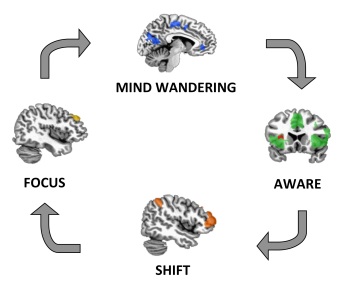Contemplative Science
How can we change the mind and brain to improve well-being and emotional connection? As Science Director at the Mind & Life Institute, I support and advance the scientific study of contemplative practices such as meditation. The emerging field of contemplative science investigates both the biological and neural underpinnings of these experiences, as well as the application of such practices to reduce suffering and enhance well-being. At Mind & Life, I host a biweekly podcast that explores insights from contemplative science in conversation with leading researchers, thinkers, and on-the-ground practitioners. I also write blogs to share recent findings from the field, and edited a book covering one of the recent dialogues between scientists and the Dalai Lama. In addition, for 8 years I coordinated numerous funding mechanisms to further rigorous research in contemplative science.
My own interests in this domain include using meditation to understand dynamic cognitive states, first-person research methods and neurophenomenology, Buddhist philosophy and the reductive nature of concepts, and the scientific study of context.
Attention and Mind Wandering
We’re all familiar with the experience of trying to focus on a task and having our minds drift off to other topics. What’s going on in the brain when this happens? I’ve conducted research that examines the neural activity associated with these dynamic states of attention and mind wandering. Using a novel paradigm involving concentrativ e meditation, we incorporated subjective input from participants into our analysis, and were able to identify distinct brain networks corresponding to four proposed cognitive phases: focused attention, mind wandering, awareness of mind wandering, and shifting back to focus. Follow-up analyses found that activity and connectivity in these networks varied depending on the amount of time a person had meditated, suggesting that these networks change with repeated experience.
e meditation, we incorporated subjective input from participants into our analysis, and were able to identify distinct brain networks corresponding to four proposed cognitive phases: focused attention, mind wandering, awareness of mind wandering, and shifting back to focus. Follow-up analyses found that activity and connectivity in these networks varied depending on the amount of time a person had meditated, suggesting that these networks change with repeated experience.
Psychiatric Disorders
Another important question about the brain’s relationship to well-being can be asked in reverse: what happens when things go wrong? Psychiatric disorders like schizophrenia are tragic and debilitating, and many existing treatments are not very effective. Understanding more about these disorders not only helps us learn about the brain, but also uncovers new horizons for treatment. In my graduate and postdoctoral work, I investigated schizophrenia from a number of angles, using molecular, psychophysiological, neurocognitive, and brain imaging technologies. More information can be found under Publications.